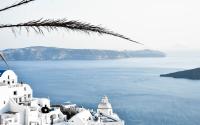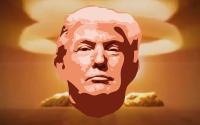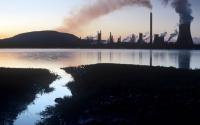26 November 2005The Independent
On 4 April 2003, I was standing on the roof of al-Jazeera's office in Baghdad. The horizon was a towering epic of oil fires and burning buildings. Anti-aircraft guns in a public park close to the bureau were pumping shells into the sky and the howl of jets echoed across the city. I was about to start a two-way interview with al-Jazeera's head office in Qatar when an American rocket came racing up the Tigris river behind me. Its rail-train "swish" brought a cry from the Qatar technician who picked up the sound on his earphones.
"Was that what I think it was?" he asked. I fear so, I replied, as the white-painted cruise missile zipped beneath one of the Tigris's bridges and disappeared upstream. After finishing my "stand-upper" - television demands rooftop scenes from Baghdad even to this day, when most of the reporters are confined to their offices and hotels by teams of hired mercenaries - I descended to the al-Jazeera newsroom where the Jordanian-Palestinian bureau chief, Tareq Ayoub, was trying to put together his next report. You, I told him, have the most dangerous television office in the history of the world.
I remarked how easy a target his Baghdad office would make if the Americans wanted to destroy its coverage - seen across the Arab world - of civilian victims of the Anglo-American bombing of Iraq. "Don't worry, Robert," Tareq had replied. "We've given the Americans the exact location of our bureau so we won't get hit." Three days later, Tareq was dead.
Al-Jazeera had indeed given their office's map co-ordinates to the Pentagon. In fact, the State Department's public affairs officer in Qatar - a man of Lebanese descent called Nabil Khoury - had pointedly gone to the station's management on 6 April to assure them their bureau would be spared. Then on 7 April, as Tareq Ayoub broadcast at 7.45am from the same spot on the roof on which I had been standing, an American jet flew across the Tigris and fired a single missile at al-Jazeera. Its explosion killed Tareq instantly. This was no errant attack. "The plane was so low, we thought it was going to land on the roof," Tareq's colleague Taiseer Alouni told me afterwards.
And Taiseer should know. He had been Kabul correspondent for al-Jazeera in 2001 when a cruise missile smashed into his (mercifully empty) bureau. Al-Jazeera had been broadcasting bin Laden's threats and sermons from Afghanistan and no one doubted at the time that the attack - which the Americans claimed was a mistake - was deliberate. After the killing of Tareq Ayoub in Baghdad in 2003, the Pentagon's soulless letter of explanation expressed its sorrow for Ayoub's death but did not even bother to offer an explanation for the attack. Why should it? After all, on the very same day, an American Abrams M-1 A-1 tank fired a shell into the Palestine Hotel, killing three more journalists. Small arms fire, the Americans said, had been coming from the building. It was a lie.
Nor was I surprised. Back in Belgrade in 1998, I had watched the Americans bomb Serbia's television headquarters, an act which, as I wrote next morning, allowed Nato to strike at targets for the words men and women said - rather than the deeds they committed. What precedent did this set for the future? I should have guessed.
So what was so strange about George Bush's desire to bomb al-Jazeera in 2004? That Lord Blair of Kut al-Amara - the man who supposedly persuaded the American president to desist from this latest insanity - should now threaten the British press under the Official Secrets Act lest they divulge the entire can of worms is quite in keeping with the arrogance of power which we now associate with the Bush-Blair alliance. British ministers cravenly repeated America's lies when US aircraft killed the innocent in Baghdad in 2003 and they will happily cover up Bush's continued desire to bomb his supposed enemies, however innocent they may be.
When al-Jazeera first broadcast across the Arab world, the Americans hailed its appearance as a symbol of freedom amid the dictatorships of the Middle East. The New York Times's messianic columnist Tom Friedman praised it as a beacon of freedom - always a dangerous precedent, coming from Friedman - while US officials held out the station's broadcasts as proof that Arabs wanted free speech. And there was some truth in this. When al-Jazeera broadcast a brilliant 16-part series on the Lebanese civil war - a subject scrupulously avoided by Beirut television stations - the crowded seafront Corniche in front of my Lebanese home became deserted.
Arabs wanted to see and hear truths that had been denied them by their own leaders.
But when the same al-Jazeera began broadcasting bin Laden's words, all the enthusiasm of Friedman and the State Department dried up. By 2003, US deputy defence secretary Paul Wolfowitz - that paragon of democracy who asked why Turkish generals did not have "something to say" when the democratically elected Turkish parliament prohibited US troops from using their territory for the invasion of Iraq - was fraudulently claiming that al-Jazeera was "endangering the lives of American troops". His boss, Donald Rumsfeld, told an even bigger lie: that al-Jazeera was co-operating with Iraqi insurgents. I spent days investigating these claims. All turned out to be false. Tapes of guerrilla attacks on US forces were delivered anonymously to the station's offices, not filmed by al-Jazeera's crews. But the die was cast. Iraq's newly elected government proved its democratic credentials by throwing al-Jazeera out of the country - just as Saddam had threatened to do in early 2003.
Of course, al-Jazeera is no golden child of journalism. Its discussion programmes are often weighed down with uncompromising Islamists, its dutiful presentation of bin Laden's tiresome sermons balanced by interviews with Western leaders far tougher than any questions put to al-Qa'ida's bearded leadership. But it is a free voice in the Middle East - and so was attacked by the Americans in Kabul and in Baghdad. And almost in Qatar. And thus British journalists must now be suppressed by Lord Blair of Kut al-Amara if they dare to reveal the latest revelation from the dark and bloody pit into which Messrs Blair and Bush have plunged us.






